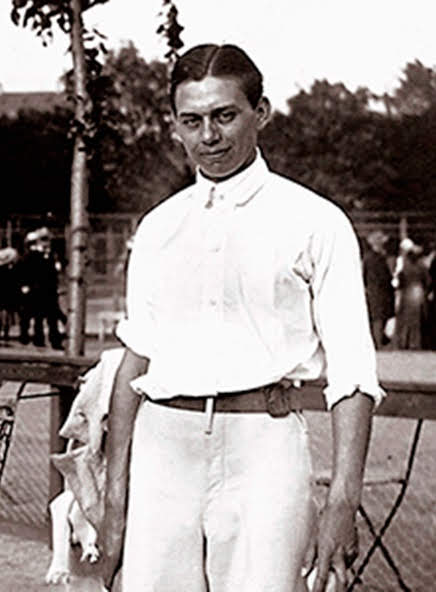

Queer Places:
Dansk Tennis Club, Rygårds Alle 73, 2900 Hellerup, Denmark
 Ludvig
Leif Sadi Rovsing, née Qvist (27 July 1887 – 17 June 1977) was a Danish tennis
player. He competed in two events at the 1912 Summer Olympics.[1]
As an openly gay man, he was excluded by Danish sports authorities who banned
his participation in several sport tournaments.[2]
Ludvig
Leif Sadi Rovsing, née Qvist (27 July 1887 – 17 June 1977) was a Danish tennis
player. He competed in two events at the 1912 Summer Olympics.[1]
As an openly gay man, he was excluded by Danish sports authorities who banned
his participation in several sport tournaments.[2]
Born Qvist (his mother's name), Rovsing was adopted in 1889. From the death of his father in 1910, he lived the life of a wealthy gentleman of independent means. Except for a high-school diploma, he received no formal education. Tennis was his primary and all-consuming interest. He won several Danish championships in doubles, and was Swedish and Norwegian International Champion in 1916 (men's single). In 1923 he reached the finals (doubles) at the Indoor World Championships in Barcelona. He was considered to have a strong serve and a good drive.
In the upper-class world of tennis, Rovsing's openness as a homosexual seems not to have caused problems. However, tennis tournaments were organised by and played in clubs that were primarily football (soccer) clubs. Consequently the Danish Lawn Tennis Association was a subdivision of the Danish Football Association. When, in 1917, the details of a visit to Rovsing's home by a young tennis player were reported to the Board of Directors of his tennis and football club. Rovsing was confronted with the working-class respectability of organised football. He argued that he had never committed a criminal act, but he was nevertheless excluded from all clubs and tournaments under the Danish Football Association. The exclusion was revoked in 1921. This caused opposition from the Copenhagen Football Association and in 1924 Rovsing was once more excluded from participating in tournaments in Denmark. His ‘opinions and his conduct’ precluded him ‘from participating in tournaments with related access to the showers and locker rooms of young players’. In 1927 Rovsing himself financed and made preparations for a separate tournament. Most of the prominent tennis players agreed to participate. The Lawn Tennis Association, however, declared that Rovsing could not participate. He now sued the Danish Football Association. The outcome was a foregone conclusion. The High Court upheld the exclusion from tournaments as justified by Rovsing's sexual conduct and by the duty of the Danish Football Association to protect its young members.
Rovsing, who had decided not to be a witness in the court case, published a pamphlet in which he claimed that he was in reality the accused in ‘The Public’ versus Rovsing. Neither the exclusion from tournaments nor the court case and the pamphlet seem to have been reported in the press. Although Rovsing's perception was somewhat paranoid, it contained a large nucleus of truth.
In Hellerup, a suburb in northern Copenhagen, Rovsing in 1919 built himself a house and a magnificent wooden tennis hall which became the home of his own tennis club, the Dansk Tennis Club (The Danish Tennis Club). It neither was nor is affiliated with the Danish Lawn Tennis Association. It is partly financed through a foundation created by Rovsing in his will.
Rovsing travelled in the Far East and lived for a long period in Bali. In his book, I tropesol og måneskin (Under the Sun and the Moon of the Tropics), he gave a firsthand account of the delights of Balinese youths as opposed to the drab and restricting conditions in Denmark. In the 1950s he became a prolific contributor of articles to the homophile journal, Vennen (The Friend), which he briefly supported financially. In 1955 his home was ransacked by the police, and he was arrested and held in custody for 15 days charged with having had sex with a minor, a prostitute under the age of 18. He denied the charges, which he saw as a revenge for his writings, but was given a suspended sentence of 30 days in jail for indecency.
Rovsing in the 1950s and 1960s published a number of privately printed pamphlets on religion, sex and society. They are incoherent and characterised by the learning of an autodidact and a man whose perception of the social realities of his times is ill focused.
My published books: